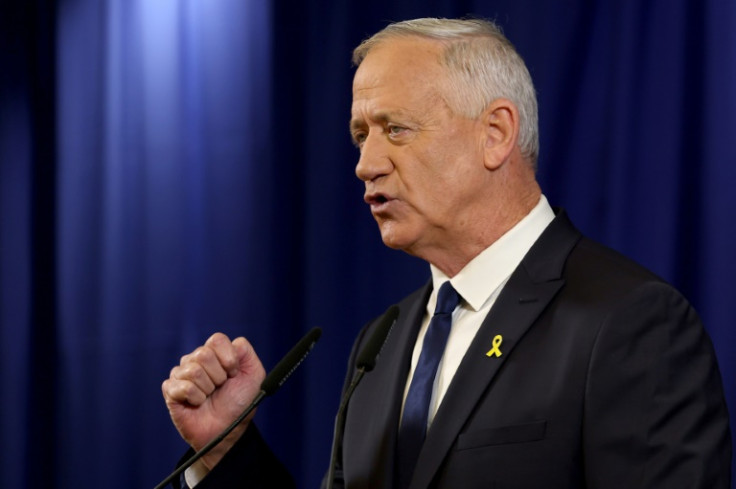
Israeli war cabinet minister Benny Gantz quit Prime Minister Benjamin Netanyahu's government on Sunday, heaping domestic pressure on the Israeli leader as the war in Gaza rages.
The former general and defence minister announced his resignation from the emergency body after failing to get a post-war plan for Gaza approved by Netanyahu, which he demanded in May.
The centrist politician's departure is not expected to bring down the government, a coalition including religious and ultra-nationalist parties, but it marks the first major political blow to Netanyahu eight months into the Gaza war against Palestinian Hamas militants.
Experts say Netanyahu could now be forced to rely more heavily on his right-wing partners.
Gadi Eisenkot, also a former army chief and member of Gantz's party, followed him out of the war cabinet, leaving the body with only three members. The war cabinet takes all major decisions about the conflict.
"Netanyahu is preventing us from progressing to a real victory. That is why we are leaving the emergency government today with a heavy heart," Gantz said.
"I call on Netanyahu: set an agreed election date. Don't let our people be torn apart."
The Israeli premier responded within minutes, saying: "Benny, this is not the time to abandon the battle -- this is the time to join forces."
Netanyahu's far-right coalition partners, National Security Minister Itamar Ben Gvir and Finance Minister Bezalel Smotrich, both also reacted quickly to Gantz's resignation.
Ben Gvir said he had "issued a demand" to Netanyahu that he join the war cabinet.
Smotrich slammed Gantz, saying "there is no less stately act than resigning from a government in time of war," and as "the kidnapped are still dying in the Hamas tunnels".
The Hostages and Missing Families Forum campaign group said the country "will not forgive the leaders who abandon the hostages". Gantz apologised to the captives' families, adding "we have failed the result test".
On Saturday, hours after Israeli forces rescued four hostages from Gaza, Netanyahu had urged Gantz not to resign.
Gantz, who turned 65 on Sunday, had been seen as a favourite to form a coalition in the event that Netanyahu's government is brought down and early elections are called.
His centrist National Union Party submitted a bill last week to dissolve the Knesset, Israel's parliament, and hold early elections.
The former army chief, one of Netanyahu's main rivals before joining the war cabinet, had repeatedly called on Israel to reach a deal to secure the release of all hostages and to make it a "priority".
Since a week-long ceasefire in November, which saw the release of scores of hostages, Israel has failed to reach any further agreement and has kept on with its fierce military campaign in Gaza.
"Israel has not made it a priority, clearly, so that was kind of the first major break when Gantz indicated that he would leave," said political analyst Mairav Zonszein.
Though Netanyahu's government is not under any threat of collapsing, Gantz's leaving does make it lose the only "moderate element" that was in the overall coalition, she said.
"Netanyahu will be left just with the far right ministers, and it's yet to be seen what role they will play."
Netanyahu is already under growing pressure from his far-right coalition allies who have threatened to quit the government if he goes ahead with a hostage release deal outlined by US President Joe Biden last month.
Ben Gvir and Smotrich have insisted the government should not enter into any deal and should continue the war until the goal of destroying Hamas has been achieved.
The coalition rules by a slim majority of 64 out of 120 seats in the Israeli parliament and depends on far-right votes.
The war in Gaza was sparked by Hamas's October 7 attack on southern Israel which resulted in the deaths of 1,194 people, mostly civilians, according to an AFP tally based on Israeli official figures.
Militants also took 251 hostages, 116 of whom remain in Gaza, including 41 the army says are dead.
Israel's retaliatory military offensive has killed at least 37,084 people in Gaza, also mostly civilians, according to the Hamas-run territory's health ministry.







